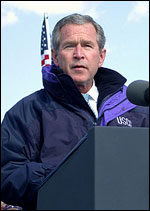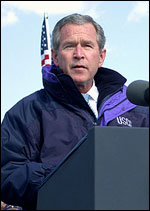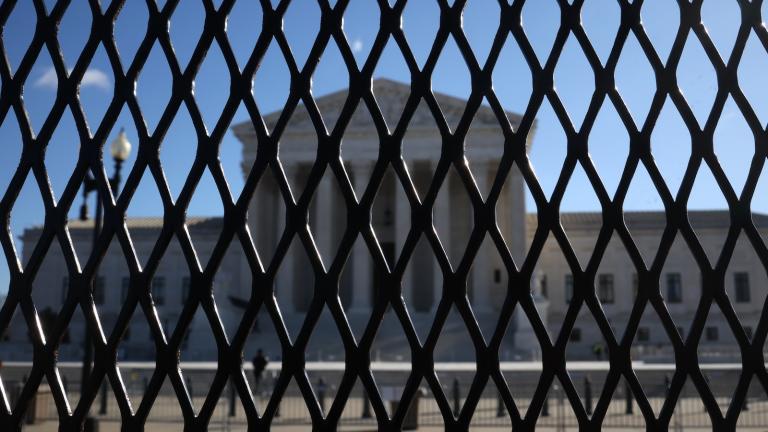RUSSIA MOVES TO RATIFY THE KYOTO PROTOCOL
CALIFORNIA IMPOSES GREENHOUSE-GAS STANDARDS ON CARS
NORTHEAST STATES TO IMPOSE GREENHOUSE-GAS CAP
EASTERBROOK SAYS “SECOND-TERM BUSH WILL BE THE PRESIDENT WHO IMPOSES GLOBAL-WARMING CONTROLS”

Could this man be a climate hero?
Guess which headline is bogus? The winner gets a free transcript of the portion of the third Bush-Kerry debate when environmental issues were discussed.
Believe it or not, all four of these headlines are real. Gregg Easterbrook, a senior editor at The New Republic, has once again ventured where no sensible human being would dare go, stretching credibility to the limit by asserting in the September issue of The Washington Monthly that President Bush will move to save us from global climate change if reelected. Searching for a legacy and watching his dream of bringing democracy to Iraq dissolve before his eyes, Easterbrook argues, W. will play against type and focus on solving the climate problem.
The sheer indifference to and skepticism of human-caused global warming on the part of this administration makes one want to dismiss this prediction out of hand as another one of Easterbrook’s pro-Bush fantasies. At least, that was my first reaction. But just because the idea came from Easterbrook doesn’t mean it’s necessarily wrong.
Consider this: The Kyoto Protocol is about to enter into force. California has moved to strictly limit greenhouse-gas emissions from motor vehicles. The McCain-Lieberman Climate Stewardship Act garnered an unexpectedly high 43 votes in the Senate when it was put to a vote last October. A group of attorneys general from eight states have launched litigation aimed at forcing major utilities to reduce their carbon-dioxide emissions. The emissions-trading market developing in Europe is increasingly active — but U.S. companies are banned from participating until their government gets on board with Kyoto.
Given all that, if one dreams a little, it becomes possible to imagine that perhaps, Bush or no Bush, a constructive policy on climate is bound to emerge from Washington during the next four years. Assuming it stands up against the inevitable court challenges, the California car legislation alone would likely bring automakers to the table begging for federal uniformity of emission standards. At that point, why wouldn’t Bush step up to take credit?
Back from dreamland. The Bush administration’s negative attitude toward science in general and science on climate change in stunning particular is unprecedented. The tone was set early and at the highest levels, after Bush commissioned the National Academy of Sciences to report on the state of climate-change science. Among other findings, the report endorsed the view of the Intergovernmental Panel on Climate Change that most of the warming of the past 50 years is likely due to the buildup of greenhouse gases from sources like the burning of fossil fuels. In accepting the report in the Rose Garden on June 11, 2001, Bush acknowledged that the planet was warming but carefully parsed his words to avoid ascribing too much of the greenhouse effect to human causes.
Then followed many well-documented episodes involving the president and his minions slandering and censoring various attempts on the part of governmental agencies to report honestly on the science of climate change. This sad chain of events was broken only a couple of months ago, when the administration declined to interfere with a report to Congress by the Climate Change Science Program and the Subcommittee on Global Change Research. That report described the status of federal research on climate, including many disturbing findings on the effects of warming. I suspect the White House, perhaps sensitized by the bad press that the administration had received due to its disregard for mainstream science across a spectrum of issues, didn’t want more negative PR during a tight election campaign. Or perhaps it was just too busy with that campaign to be paying attention.
Add to all this the fruitless attempts by former U.S. EPA Administrator Christie Todd Whitman and former Treasury Secretary Paul O’Neill to set a sensible course on climate change, and Bush and Cheney’s energy-industry mindset, and the case for a sudden turnaround seems delusional.
Even if Bush is ultimately swayed by companies subject to regulation and litigation, or — and here’s an Easterbrook-esque long shot — the international community (trade sanctions, anyone?), to make some concessions on climate change, a proactive climate policy, such as the one espoused by John Kerry, is more likely to bring results.
So at this point, I’m crossing my fingers that we’ll never find out whether Easterbrook has stumbled onto the truth or not.



